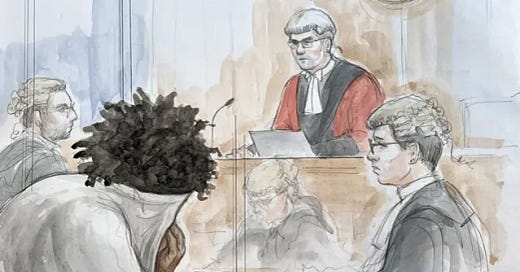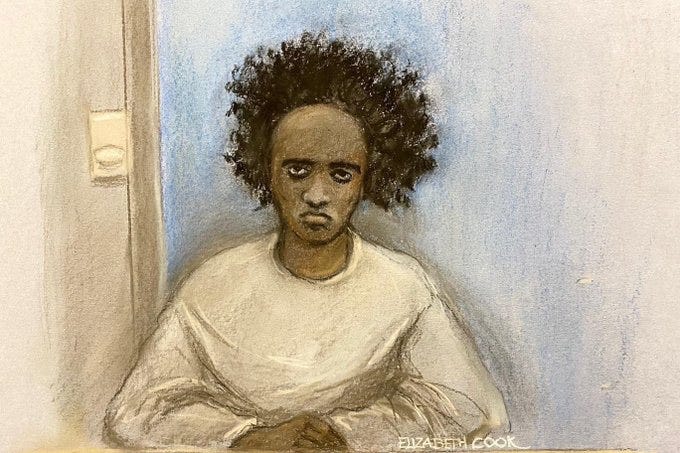'Rudakubana is NOT mentally ill'
Southport Stabbing suspect deemed fit to stand trial after extensive psychological testing
There will be no platitudes of “mental illness”, “vulnerability”, or “compassion” —Ruduakubana is going to be subject to the full force of the law.
The justice system in 21st century Britain appears to deal out more mercy to the offender than it does the victim. Every week, it seems, newspaper headlines disclose horrifying accounts of rape and murder which are excused on grounds of mental illness and want of understanding. Public feeling that these verdicts are, in some cases, being handed down without due cause and that the jury are overly generous in their interpretation of the accused actions. Someone accused of committing a crime can hardly be said to be “living their best life.”
In the case of Axel Rudakubana — the teenage accused of exacting the Southport massacre — public concern has been raised about Rudakubana avoiding trial or being spared a prison sentence (should a jury find him guilty) with a plea of mental illness. This is a concern shared by some of the families of the victims.
From the reading of first charges on 1 August, it became apparent that Axel Rudakubana’s defence counsel would be looking to make a case that Rudakubana is unfit to plead or bears “diminished responsibility.” for his actions.
Under the ‘Coroners and Justice Act 2009’ — Section 52.1 — a person who kills cannot be be convicted of murder if they were suffering from an abnormality of mental functioning.
At this reading of the charges, it was disclosed to the judge that Axel Rudakubana has an Autism Spectrum Disorder (ASD) diagnosis. He had been “unwilling to leave the house and communicate with family for a period of time”, relayed the prosecution.
The reaction in the mainstream press was immediate, unified, and one dare say orchestrated. Axel Rudakubana is portrayed as a “very quiet” choir boy. An “introvert”. “Clingy,”recount one of his neighbours to The Mirror. Photos of him as a young schoolboy — several years out of date — were circulated and featured beside image of three girls killed — Elsie Dot Stancombe, Alice da Silva Aguiar, and Bebe King.
The inference had been unmistakable and unforgivable. The press were asking the public, “Should we not be viewing the accused as a victim, also?”

What is “fitness to plead”?
Before a trial, it is for the judge to determine if the defendant — the person being accused of committing a crime(s) — is fit to plead and to stand trial. This is determined on the balance of probabilities with medical evidence, if the defendant raises the issue.
Where the issue of unfitness to plead arises, the court does not consider the accused’s guilt but rather their capacity to understand proceedings. The defendant must be demonstrated to be “under a disability” which renders it inappropriate for him or her to be tried. This can be due to a disability caused by a physical impairment or a mental disorder.
“Fitness to plea” is distinct from a “plea of insanity”. “Fitness to plead” relates to the ability of the defendant to understand court proceedings whilst “Insanity” claims that, at the time of committing the act, the suspect was labouring under such a “defect of reason”.
For a plea of insanity to be upheld by the court, it must be demonstrated beyond reasonable doubt that the defendant did not to know the nature and quality of the act being done, or, that the suspect did not know what was being done was wrong.
When determining whether or not a defendant is fit to plead, six key questions are asked:
Can the defendant fully understand the charge(s) they face?
Do significant literacy and/or mental health problems impinge upon the defendant’s capability to interpret the key points of a trial?
Can the defendant provide what's considered a coherent explanation of events to their legal team?
Is the defendant suitably equipped to understand the course of proceedings?
Does the defendant understand the legal advice they will receive?
Will a defendant understand what the function of key figures are at a criminal hearing — judge, jury, prosecution etc.?
If the judge finds the defendant to be unfit to plead, then a jury will determine whether or not the defendant did the act of which they are accused, without considering the defendant’s mens rea — lack of intent, diminished responsibility. This is known as a “hearing” and not a trial.
If the defendant does not demonstrate significant impediment in understanding, they will be deemed “fit to plead” and the charges will be carried forward into a trial.
Is Axel Rudakubana “fit to plead”?
It is understood the defence counsel had pursued a rigorous psychiatric assessment of Rudakubana.
Following media emphasis and Rudakubana’s enduring silence, it had been accepted in the public square that Rudakubana is suffering from intense mental illness and struggles to relate to the world as a result of his learning disabilities.
It had been with some surprise, then, that none such cases were presented to the court at Rudakubana’s plea hearing. When the time came for the defence counsel to speak, they offered no defence statement, no psychiatric evidence, and no application for admissibility. In brief, they found him no significant impairment or illness as relates to the “fit to plead” criteria.
It is for the prosecution prove all allegation. This is to say that the prosecution are free to pursuit all sixteen charges.

This is offers a glimmer of hope to the victims and their families. Whilst the pleas of "not guilty" entered on Rudakubana’s behalf will force the families through the gruelling indignity of a courtroom trial, they will not be subject to a watered down justice at the end of it. Should the accused be handed down a guilt verdict, one can — for the moment at least — expect the sentencing to unvarnished by platitudes of “vulnerability” and “compassion.”
Unless events take a dramatic turn, Axel Ruduakubana is going to be subject to the full force of the law.
Why are the media determined to find Rudakubana innocent?
Whilst a great concerns have voiced about prejudicing the trial in the direction of Rudakubana’s guilt, there has been a subtle absence of concern about the trial being prejudiced in the direction of Rudakubana’s innocence. National newspapers have been free to assert that Southport Stabbings are the result of an unmanaged mental health condition, regardless of evidence, or the impact such unconfirmed narratives could have upon shaping the impressions of a jury member before the trial.

Should Axel Rudakubana have been pronounced unfit to plea, there would be wide spread acceptance of this ruling because, well, it makes a great number of uncomfortable questions disappear. The story of a vulnerable and fragile choir boy turned rogue. It is a tragic story, the seed of which was planted in the nation’s mind in the height of summer. Come the winter, a great number of people are ready and willing to believe it, and repeat it, and let the matter pass over into forgotten memory if it makes the event disappear from their social media timeline.
Why?
One must understand, that the story of failed integration and incompatible cultures flies directly in the face of such tenets as, “Diversity is our strength” or “Islam is a religion of peace.”
As soon as a heinous attack has been perpetuated and the suspect is revealed to be an immigrant in background or heritage, it becomes necessary for the Establishment to convince the public — to assert regardless of evidence — that this individual has killed, raped, or maimed because he or she is suffering a mental illness.
Immigrants who perpetrate evil in a foreign land must be absolved of wilful wrong doing, lest their heinous behaviour become a reflection of the place from which they originate or a commentary upon multiculturalism and a challenge the success of mass migration itself.
“Forgive them, they know not what they do,” is, however, a towering request from secular society.
Of course, this framework by which the nation are to interpret new arrivals is not my own but has been handed down to me. As a child, I might have noticed a classmate had different coloured skin as I noticed another had freckles or ginger hair, which is to say, these outward characteristics held no moral content. I understood these features to be superficial to the soul of a person. By the time I became a teenager, however, I had been coached that such ambivalence towards a person’s ethnic heritage was racist: not only should I take into account their background in my everyday interactions with them, I should priorities the recognition of features and understand them as conferring a wisdom and a virtue which I did not, by the nature of my birth, possess.
These claims suited “anti-racist” activists until it emerged that patterns of crime and anti-social behaviour, as well as talents and physical attributes, correlated with race. It was then that conflicting demand was then made of the public — that all virtues a black or brown person possesses (insulting a these totalising labels are) are a direct result of their racial heritage and “ethnic” or “indigenous” background whilst all vices are a direct result of a misunderstanding of that race or culture or religion; or, better still, originate from a force that is independent of their race, such as a mental health condition or a spirit of evil — a psychopathic tendency which is universal to all deprived human beings.
If absolution cannot be secured then compassion is to be laden upon the offender — a public declaration of him having been wronged by society. By this declaration they pronounce, “We understand you” and “We recognise our own culpability in your wayward nature.” But as Adam Smith recounted in The Theory of Moral Sentiments, “Mercy to the guilty is cruelty to the innocent.”
I want no other verdict for Axel Rudakubana than the right verdict.
Instinct is a neglected faculty in the discerning of guilt from innocence. This collective intuition for what is, and what is just, is, afterall, the foundation of British Common Law. But sentiment must be mediated with logic. Justice also exists to protect the accused from the mob instinct — that is until is guilty has been assiduously demonstrated (where guilt exists). It is not to be determined by the shape of a skull or the colour of one’s skin but by blood and fingerprints and the evidence of one’s own eyes.
Each man and each woman has their own opinion as to the right and proper outcome of this case. But it is incumbent upon all of us to have faith, if only for a time, the British judicial system remains capable of delivering judgements as our forebears intended.
Support my work
I embarked upon this investigation last year because I am of the sincere belief that this case, whilst being handled in a manner which serves the best interests of the accused, is failing to be handled in a manner which serves the best interests of the public and the victims.
As a writer, I knew my standard publishers would not dare to publish the things that I was discovering. I resolved therefore to take the risk to research independently, and make my essays free to read and share in the public domain.
If you would like to support me my research the best way to do this is to subscribe to this Substack — this help is never expected but is forever appreciated.
You can also donate to the ‘Southport Strong Together’ appeal which are supporting the victims of the Southport massacre.














